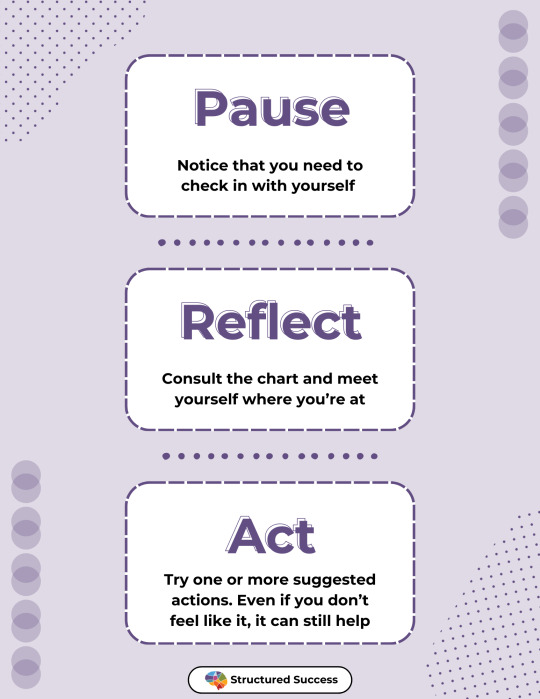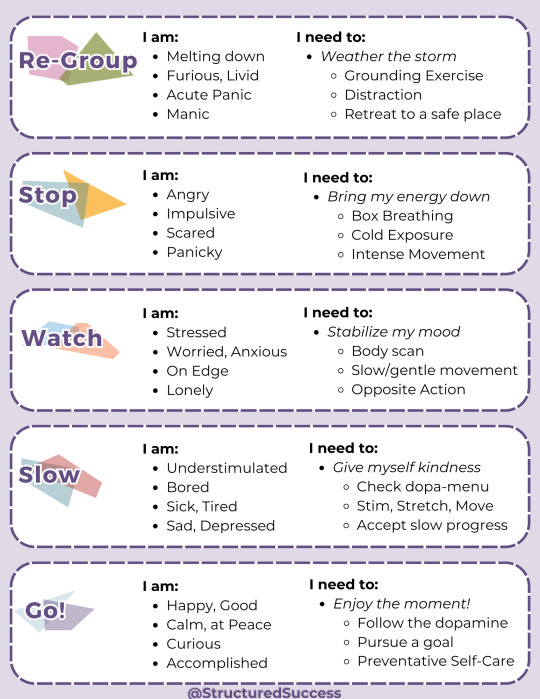Long form content from a person with one of the shortest attention spans
Don't wanna be here? Send us removal request.
Text
Zones of Regulation: An Emotional Regulation Worksheet
Emotional regulation is hard. It's especially hard when you have ADHD, BPD, autism, or other neurodivergent conditions that create executive function barriers, flash emotions, or struggles to even identify what the emotion we're feeling is in the first place.
So I made something to help:



How it Works!
Rather than having to identify the exact emotion, the goal is to figure out which Zone of emotion we're in. These Zones group emotions into larger buckets based on the type of emotion, how it feels in our body, and (most importantly) what we need when we're experiencing them.
The Zones.

Re-group.

The first Zone (Regroup) describes times when we're in distress and just need to weather the storm. These emotions can feel out of control, overwhelmingly powerful, or completely consuming, and fighting against them rarely works. Examples include meltdowns, mania, panic attacks, fury, etc.
When we're in this Zone, stabilizing and getting through is the highest priority. After all, we can't make good decisions for the short- or long-term in active crisis. This is a great time for grounding exercises (such as the 5-4-3-2-1 technique), distraction, or retreating to a (sensory-) safe place.
Stop.

The second Zone (Stop) is for times when we're feeling very heightened, threatened, or on edge. Usually this feels like having a lot (or even too much) energy and like we could spiral out of control. This can include feeling angry, panicky, scared, or extremely stressed.
The goal in this Zone is to stop and bring the energy back down again. Activities that give a productive place to burn excess energy, such as intense exercise or moshing, or require slow, deliberate actions, such as slow breathing exercises or cold exposure, are a good fit here
Watch

The next Zone (Watch) is for times that we're feeling off kilter. We might be feeling confused, stressed, nervous, lonely, slightly dissociated, or on edge. Emotions in this Zone can be sneaky, lowering our defenses or threatening to spiral towards other Zones.
Our main need in this Zone is to be cautious and defend against spirals. This might mean slowing down our interactions with people, focusing on slow and gentle movement (such as walks or tai chi), practicing opposite action, doing body scan meditation, or journalling
Slow

The fourth Zone (Slow) describes time when we just can't get moving. We might be feeling sad, bored, understimulated, sick, or dissociated; but progress, movement, and sometimes even thinking feels like it takes more effort.
In this Zone, forcing or pressuring ourselves can be a trap that only makes matters worse, so the primary goal is self-kindness. This means accepting that we're moving slowly, being distracted, or being less efficient. It also means looking for those sources of reward and joy as healthy sources of energy
Go!

The final Zone (Go!) probably needs the least explanation. This Zone is for times when we're feeling chill, calm, focused, curious, or engaged, and the goal for this Zone is to capture the moment and enjoy yourself.
Taking time to appreciate when we're in this Zone is key to future motivation! Having evidence that we've been happy and engaged (and that we will again) can help us regulate when we're in Zones we don't appreciate as much. Make notes here about things you love and cope ahead if you can!
Of course, exactly where one Zone ends and another begins is going to be different from person to person, and what each of us needs and the skills that work for us are going to different as well. So remember: These Zones aren't set in stone. Adapt them to fit you, and here's a blank version to help with that:

Like emotions themselves, there's no such thing as good or bad Zone. And there's no such thing as a normal progression from one Zone to another. The primary purpose for these Zones is make it easier to identify, talk about, and regulate our emotions, not to shame or problematize.
Remember, processing emotions is a LOT to ask while we're in the middle of feeling them. If it's helpful, print this out, and keep it visible and accessible for when you're feeling a type of way. That'll make it easier to identify and act on.
I hope this helps!
#zones of regulation#emotional regulation#adhd#autism#neurodivergence#mental health#worksheet#coaching#adhd coaching#ahhhh i put so much work into this i hope you like it
2 notes
·
View notes
Text
If you have a bad case of "Out of Sight, Out of Mind," the way that a lot of ADHD'ers do, why on earth would you think this doesn't apply to your accomplishments?
If you want to make them feel real, or even just remember them really,
KEEP THEM VISIBLE.
0 notes
Text
Let's talk about that autism registry thing...
I've seen a few posts now where people are talking about this RFK autism registry thing in very all-or-nothing ways, to the point of wondering if their life is over.
I'm not going to pull punches, it's probably going to be harmful, but your fight; our fight isn't over.
Let's talk about it
The context:
RFK has made a promise to find out the cause of increasing autism rates by September. To do this, he isn't asking experts, he wants to compile a database of autistic people and our private health records to study the issue.
RFK would like to make this database available to researchers (including researchers he hand selects) to study increasing autism rates.
I'm not going to lie. This is bad. This is bad science. This is probably going to be harmful to autistic people and community… but it's also complicated.
The complications:
Having a disease database isn't a new thing, even in the US. There are databases like this for more threatening conditions to public health, such as cancers, infectious diseases, and bio-threats already. They are used in science and public health monitoring and can be good.
In a number of countries (especially Scandinavia), public health databases like these exist, including of autistic, ADHD, trans, and other vulnerable groups. These databases can do a lot to further research with vulnerable communities…
but they can also be a massive liability.
The Difference:
The current US administration.
The current US administration has clearly and repeatedly shown they don't mind (or actively wish to) harming vulnerable communities. RFK has stated numerous times his dangerous and dangerously misinformed opinions about autistic people.
So, while public health databases can be used for good things, I don't think this one is going to be. However, it probably isn't the end times either.
The Probable Future:
More than likely this database is going to be used (first) to further disinformation about autism, including vaccine myths. Spreading disinformation about autism, especially from a government, is going to be immeasurably harmful, no doubt.
But we've been here before. We've fought mis/disinformation and we have the tools and community to do it again.
What worries people:
What worries people is what happens after. The current US administration has been shown repeatedly that they are willing to use private data that they have on citizens to harm people.
They have used data like this for ICE raids and targeted doxing already. No one can promise that this database will not be used the same way.
That said, the path between where we are now and using this proposed database for targeted harm is windy and uncertain. We are not there yet, and there are still things that we can do.
What we can do:
1) Take care of yourself.
Make sure that you are meeting your physical, mental, and sensory needs, at least to a bare minimum level, before giving too many spoons to others.
2) Build community.
You probably have autistic family members. Talk to them.
Is there an autistic-led organization in your area? Autistic-led peer support? Reach out to them. Talk to other autistic people and share resources
If there isn't autistic-led organizations in your area, can you start something? It doesn't have to be big or perfect or consistent.
Heck, even an autistic-run D&D campaign, or social group, or bowling night would build community, just so long as it gets people meeting!
Just don't leave anyone behind. Include the most vulnerable (those in group/care homes, non-speaking, etc.) among us in these communities.
3) Communicate with your physical or mental health care team.
They may not be able to amend past health records, but they can certainly change the notes they take in future.
Be careful though, as these notes are an important part of disability programs and may be necessary for those purposes.
4) Continue making noise.
Get the media involved. Be loud at people who could be involved with the database (researchers, government officials, committee members). Talk to your representatives.
5) What'd I forget?
What are other things we can do the push back in this moment?
#rfk jr#autism#autistic#autism acceptence month#fuck rfk jr#autism registry#community building#neurodivergent#audhd
15 notes
·
View notes
Text
Hot take, I know, but I don't think I like RFK Jr. very much guys
0 notes
Text
Red flags someone using boundaries to control your behaviour
People who use 'boundaries' to try to change your behaviour are very rarely talking about actual boundaries, they're talking about control. boundaries are not "do this or else." Boundaries are actions the person who has the boundary takes to protect their safety, health, or wellness.
Here are some red flags for when "boundaries" might actually be about controlling your behaviour:
Framing their boundary as something that you do, often without a specific request. Example. "I have boundary around people smoking" implying that you can't smoke
Having outsized actions as a response to a boundary being broken. Example. "When you do that, I harm myself"
Using boundaries not for safety or wellness, but personal preferences or comfort. Example. "I have a boundary around goofing off like that in public"
Leaving no option for you to continue a behaviour that don't like, even when they aren't around. Example. "Wearing that out, even on your own, is breaking my boundary"
1 note
·
View note
Text
My brain when I'm too warm: Anxiety! Irritability! Discomfort! Brain fog! Overwhelm!
By your powers combined, I am SENSORY OVERLOAD!

2 notes
·
View notes
Text
So many people believe that, without feeling guilty about their neurodivergent traits or symptoms, they won't take steps necessary to reduce the impact of these traits on their life or the lives of people around them.
This is just fundamentally false, in my experience.
In fact, I've found that feeling guilty about our neurodivergent traits is usually a barrier to making the environmental changes, asking for accommodations, or seeking support that we need to.
1 note
·
View note
Text
Life with delayed emotional processing be like:
Them, watching me be completely calm in an incredibly upsetting situation: You're so easy going.
Me three days, super upset just chilling the couch: I don't understand. I'm so easy going though ;;_;;
#emotional processing#emotional regulation#audhd#actually autistic#delayed emotional processing#why am i like this
2 notes
·
View notes
Text
A lot of autistic people struggle with using the right tone for the right social situation, but this can be much more complex than just not understanding social roles.
Being autistic can also impacts interoception and motor control, for example, which can play a role in producing the vocal tone we want or being aware of the way emotion, somatic, or behavioural impact our vocal tone
17 notes
·
View notes
Text
Yes, but not driving. Trying to sleep ;;_;;
My brain when I'm driving: omg there's so many things i'd love to do right now, let's brainstorm ideas that you can't write down because you're driving and get excited about an activity you haven't touched in months and
My brain when I actually try to do those things: you want me??? to work???????? i'm sorry i can't do that
2K notes
·
View notes
Text
There are a lot of people out there who seem to think diagnoses, or increased prevalence of diagnoses, is a problem because they see diagnosis as limiting.
For a lot of people it's actually freeing, validating, and normalizing. We may not be neurotypical, but understanding that there are others like us can offer community, support, and even bolster self-worth
2 notes
·
View notes
Text
I know I've been silent for a while on socials, and I want to let y'all know what's going on. (It's nothing bad, I promise!)
TL;DR: The gist is that I'm really struggling to find a way to use social media without getting absolutely sucked into the gaping chasm of hopelessness doomscrolling inspires in me. What helps you
--
Like a lot of people at the moment, I've found everything going on in US and international politics overwhelming and distressing.
And like a lot of people, it's had me questioning if there are different things that I could be doing to build the world that I want to see, and I've been acting on that.
What this means for me is building up community in other parts of my life, getting involved in efforts to support and build the world I want to see, and looking for ways to bring hope to other people when I can.
What I've been doing:
I've been meeting with like-minded, action-focused friends, brainstorm next steps.
I've been joining committees within my local community to bring a voice to important social issues I care about, including trans inclusion and acceptance, neurodiversity, and general empathy for our fellow humans.
…I've also used these roles to just be a barrier to those who'd ignore human rights.
I've been finding what the right level of informed is for me, trying to make sure I have information to keep myself, my clients, and the people that I love safe, all while not becoming paralyzed, overwhelmed or hopeless.
And I've been trying to support other people in finding that for them too.
So far, I think I've been doing a really good job of making these changes in many aspects of my life, but social media is a different story for me ENTIRELY.
I feel like I get dazed by social media. My intentions go out the window and I end up doomscrolling through things I know will distress me.
Social media can be (and for me is) an important source of community building and information sharing, so I really want to find a balance that works for me.
I don't know what that looks like right now, but I'm going to keep trying (and this isn't a "people need to change for my comfort post").
I also know that I'm not the only person in this place right now, so I'll turn the question to y'all:
How are you striking that balance with social media right now?
How do you use it for community building without falling into the gaping chasm of hopelessness?
Do you have strategies? tools? info?
0 notes
Text
There are a fair number of people who think that autistic and/or ADHD folks are a full-ass different species or something.
Among neurotypicals, this belief leads them to discount our repeated, consistent struggles because they experienced something similar once.
Among the autistic and/or ADHD folks who think this, this belief leads them to think that neurotypicals can't or don't experience things we do.
Neither of these are true. ADHD and autism are not the white to neurotypicals' black. The differences are of severity, degree, and frequency.
96 notes
·
View notes
Text
Just because you've collected a lot of tools over the years doesn't mean you shouldn't ask for a friend's help to put up a new shed, and doesn't mean you shouldn't call a professional when you want to add an extension.
Yes, this is a mental health metaphor.
14 notes
·
View notes
Text
Rejection can be extra painful when you have ADHD. Here's what we know
Rejection is something that everyone experiences throughout many aspects of their lives. Some of us are more sensitive to that rejection than other people, and ADHD'ers are among the groups at highest risk of being particularly sensitive to rejection. This sensitivity can impact every aspect of our lives and harm our self-esteem and self-worth. Let's talk about what it is and what we can do about it.
What is Rejection Sensitivity

Rejection sensitivity is a strong emotional or dysregulating reaction to rejection, perceived rejection, or anticipated rejection. Depending on the person and situation, the resulting emotional distress can take the form of intense sadness, fear, anger, or even physical pain. These emotions may be displayed or acted on, but many people learn to partially or entirely internalize these reactions over time.
While rejection sensitivity is more of a general trait than a symptom or diagnosis, people with ADHD are generally more likely to experience rejection sensitivity. There are a few reasons why this might be the case.
What Causes Rejection Sensitivity

Research has yet to determine the root cause for rejection sensitivity for people with (or without) ADHD. Some theories as to its origins do exist, and the ones that are common among researchers and ADHD'ers themselves include the impact of past experiences of rejection, more general struggles with emotional regulation, or all-or-nothing thinking.
Past Experiences with Rejection

Everyone has experiences with rejection, but people with ADHD often have more experience than most. After all, ADHD has very real impacts on our behaviour, relationships, and emotions. When we struggle to regulate attention, struggle with being on time, struggle to sit still, or struggle to remember important information, for example, we can receive a lot of negative feedback from teachers, parents, or peers. These admonishments for our symptoms and their impacts can also carry social consequences including rejection, ostracism, and isolation.
Repeated experiences with rejection, and especially in childhood, add up over time and can become a sore point that can damage our self-esteem and sense of self-worth. These past experiences can make the possibility that we might be rejected again far more painful or can lead to understanding rejections as confirmation of deep-seeded insecurities. This heightens the emotional toll of failure and rejection and could explain some of the added distress we experience later in life.
Emotional Regulation

A lot of people with ADHD report having bigger, faster emotions than non-ADHD'ers. These big emotions mean that our emotional responses (both internally and externally) are often stronger than our non-ADHD peers, making negative emotions an intense and painful experience. Worse yet, because these feelings are so fast, they can often show up suddenly and seemingly without warning. This short circuits our ability to inhibit our emotional response, making understanding, analyzing, and addressing our emotions more difficult.
Both the size and the speed of emotional responses makes regulating emotions difficult for many ADHD'ers. Without adequate tools to regulate these, negative emotions (such as those caused by rejection) can impact us longer and much more deeply. Since rejection can inspire these particularly strong, fast, and negative emotions, it is possible that sensitivity to rejection might be a result of larger struggles with emotional regulation for ADHD'ers.
All-or-Nothing Thinking

Due to the executive functioning differences that we experience, people with ADHD are often more susceptible to all-or-nothing thinking, or black-and-white thinking. We may, for example, feel like the only way that we can progress towards our goals is to get everything in our life together right now, or feel like a new hobby or interest should be a substantial part of our identity until suddenly it's not.
In social situations, all-or-nothing thinking can make it feel like the only options are having a rock solid relationship with another person or them never speaking to us again. This makes even relatively small social rejection, including perceived and anticipated rejection, feel incredibly dangerous. After all, if these are the only two options our mind presents and there's evidence that the relationship isn't rock solid, the only other option is painful to consider.
Impacts of Rejection Sensitivity

Regardless of the cause underlying it, rejection sensitivity can have a massive impact on our lives. Feeling intense, painful emotions is incredibly unpleasant, and most people attempt to avoid such pain wherever they can. When even small rejections feel intensely painful, we can start to avoid even the possibility of rejection. This can leave us feeling socially isolated as we avoid social interactions that could lead to rejection, encourage perfectionist behaviour where we don't approach an activity unless we're assured we won't fail or be rejected, or encourage people pleasing behaviour.
These impacts aren't just limited to relationships with our friends, however. These same responses can impact our work, school, and romantic relationships. The prospect of being rejected can prevent us from applying for new jobs, promotions, or academic opportunities. Rejection sensitivity can make it harder to ask for help from professors, colleagues, and supervisors when we need it, and it can make romantic and sexual relationships more painful, and thus harder to approach or navigate.
Internally, rejection sensitivity also does a number to our sense of self-worth. When rejection looms so large on the horizon, it can be easy to forget the times we've had rewarding social interactions or succeeded against all odds. Rejection sensitivity can lead us to view ourselves as a collection of failures and teach us to doubt our abilities and expect to be rejected. Ironically, this ends up reinforcing rejection sensitivity making experiencing it more likely and more painful.
What Can we do About Rejection Sensitivity?

More important than anything else on this list is this: Self-acceptance. Rejection sensitivity is painful enough. It's only made worse if we feel like we're failing or doing something wrong for experiencing it. Being sensitive to rejection can just be a part of us without it being something worth feeling guilty or ashamed of. Simply removing this guilt and shame can go a long way to soothe the pain from rejection sensitivity and reduce its negative impacts.
Emotional Regulation

Beyond self-acceptance, emotional regulation and distress management skills are helpful in navigating the pain of rejection or perceived rejection. The aim of distress management skills is generally to survive overwhelming or potentially dangerous levels of dysregulation and bring us to a place where we can process our emotions. Emotional regulation is the processing of those emotions, where we acknowledge, understand, and investigate our emotions in a way that supports our relationships with ourselves and others. There are a lot of different skills under each of these categories, but some I've found helpful for rejection sensitivity include:
Adding a Pause

Rejection, like other intense emotional experiences, can encourage impulsive behaviours that might not be in our best interest. Controlling impulsivity is particularly difficult for many people with ADHD, so relying on willpower alone usually isn't enough. Instead, adding an activity that slows us down or prevents us from responding impulsively can be helpful here. This can be physical activity, such as intense exercise; distraction, such as a show or game; breathing exercises; or just about anything else. The goal is simply to not respond and give yourself time. Importantly, having a preplanned script or action is often necessary for keeping impulsivity at bay when you have ADHD, so make sure to plan ahead.
Thinking Dialectically

Thinking dialectically is essentially the opposite of all-or-nothing thinking. It involves understanding a situation from multiple perspectives at the same time, or understanding that two things that seem incompatible can be true at the same time. For example, it can be true that I feel rejected by my partner and it can be true that they still love me.
When I was first exposed to this skill, it broke my brain for little while. My initial reaction was that if I'm feeling hurt, the person who hurt me did so on purpose. While this can be true, much more often different people are acting on different information with different goals. This means that people can hurt us without doing so maliciously, for example, or that we can feel rejected without it meaning a catastrophic change to our relationship.
Practicing this skill often means trying to view the situation from the other person's perspective, even when the situation resulted in us feel distressed, rejected, or hurt. One way to develop this skill is to explore explanations other than our most catastrophic fears. Could the rejection have happened because they're feeling tired or socialed out, for example? Or perhaps could I have information that they didn't have?
Medication and Therapy

Because rejection sensitivity can be related to past traumas, emotional regulation, or cognitive distortions, therapists can be a particularly valuable resource for learning to cope with rejection sensitivity. Many therapists have training and experience helping clients unpack traumas, learn emotional regulation skills, and challenge cognitive distortions; however, a therapist with specialist training in working with ADHD clients may have an easier time communicating in a way that takes ADHD into account.
Pharmaceutically, there are also options to support ADHD struggles with emotional regulation and rejection sensitivity. While stimulant medications may be helpful for some people in this regard, non-stimulant options, such as guanfacine, may support these symptoms more directly. As always, speak to your prescribing physician about the options that might be best for you.
Ultimately, rejection sensitivity may not be a diagnosis in its own right, but it is a common experience to many people with ADHD, and can has a destructive impact on our relationships with ourselves and others. No one deserves these destructive impacts. Emotional regulation strategies, such as self-acceptance and thinking dialectically can help, but don't be afraid to call in the professionals.
#adhd#actually adhd#neurodivergent#adult adhd#rejection#rejection sensitivity#rsd#rejection sensitive dysphoria#emotional regulation#self acceptance
6 notes
·
View notes
Text
Comparison is inevitable, feeling like crap from them doesn't have to be
I've noticed a morbid fascination in neurodivergent spaces with famous or successful people who are, or might be, neurodivergent.
Part of this, I feel, is a desire for role models; people who can validate that we can still be successful while also being neurodivergent. This feeling is correct, of course. You can be successful and be neurodivergent.
However, looking at high-profile people often have other privileges (or just luck) for that validation can set the bar so high that we may never make noticeable progress towards achieving that success. This can be dangerous to self-worth.
At the same time, some neurodivergent people can feel extremely negative about themselves because other, famouser, people have managed to be successful when they haven't. If they also face the same barriers, as the comparison goes, my lack of success must be a failure of my own. This, of course, isn't true, and isn't helpful to self-worth.
For some, this can lead them to focus on these other privileges to the point they deny or explain away the person's neurodivergence as a way to protect their idea of themselves.
This is where a lot of people would add a pithy line about how we shouldn't compare ourselves to others, but I don't think that is even possible. In my opinion, the fascination with famous or successful neurodivergent people is neither good nor bad, but it can have positive OR negative impacts on self-worth.
For me, comparisons are a tool. If they build you up, use them! If they tear you down, let them go.
2 notes
·
View notes
Text
I hate the term 'careless mistake' when related to ADHD because a lack of due care usually isn't the cause.
Usually it's automated processes such as information processing, working memory, or attention regulation that leads to the mistake
If you're looking for ways to prevent 'careless mistakes,' please start by acknowledging you do, in fact, care.
Then let's find the root of the problem and address that. For example, you can set up the information in a way that's easier for you to process (eg. visual vs written)
Changing the way that you have the information is presented, such as going through the first time using words then the second time as visuals is particularly helpful.
Reducing compound items (where three steps are written as one single step) can help too.
Also, everyone normalizes to information, steps, or lists over time, so it is not abnormal, wrong, or bad to have someone else check if you missed something obvious.
If you don't have someone to check, put it down and check it later, especially after a mood shift or a cognitively different task. This can help you to focus on different details.
Combining this with changing the way the information is presented is particularly helpful, imo
16 notes
·
View notes